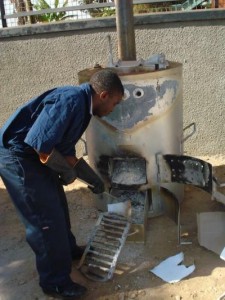McLaughlin-Rotman Centre for Global Health
12 December 2010
Africans strengthen ability to meet health needs in sub-Sahara with homegrown science solutions, but many products stagnate in labs for want of commercialization know-how, support

Invented by Moses Musaazi of Makerere University, Uganda, this easy‑to‑use, inexpensive, WHO‑approved portable medical‑waste incinerator could help solve the problem of hospital waste management in rural areas, especially during mass polio immunization and similar programs. The incinerator requires no fuel other than the medical waste and achieves temperatures of 800 degrees C. It is one of 25 technologies MRC researchers discovered stagnating in health research institutions in Africa ‑‑ products with the potential to improve local health but which exist only in a lab due to a failure of commercialization or support. Credit: Ken Simiyu, McLaughlin-Rotman Centre for Global Health
Global health experts today published a landmark collection of papers that together provide a unique microscope on the experience of countries, companies and organizations in sub-Saharan Africa addressing neglected health problems with homegrown drugs, vaccines, diagnostics and other creative scientific and business solutions.
The first-of-its kind study chronicles the triumphs and troubles of entrepreneurs, institutes and firms in Africa creating innovative, affordable technologies that bring hope to many sufferers of local diseases. While some have yet to succeed, several organizations cleared major hurdles to finance and create products, some of which may expand into global markets one day.
It is the first research offering a broad range of evidence and concrete examples of African innovation to address local health concerns. The papers draw on the experiences of authorities, researchers and entrepreneurs in Ghana, Kenya, Madagascar, Nigeria, Rwanda, South Africa, Tanzania, and Uganda. In addition to efforts involving health products, the experiences of health venture capital funds in African and other developed countries are profiled.
The papers were produced by Canada’s McLaughlin-Rotman Center for Global Health (MRC), at the University Health Network and University of Toronto, and published as a special supplement in the UK-based open-access journal publisher BioMed Central Dec. 12 (with full public access atwww.biomedcentral.com/bmcinthealthhumrights/10?issue=S1). One of the papers was published earlier in the journal Science.
Full news release text, click here
Coverage summary, click here
Example coverage, by Nature Magazine, click here, by Agence France Presse, click here, Coverage by PostMedia News, Canada: click here